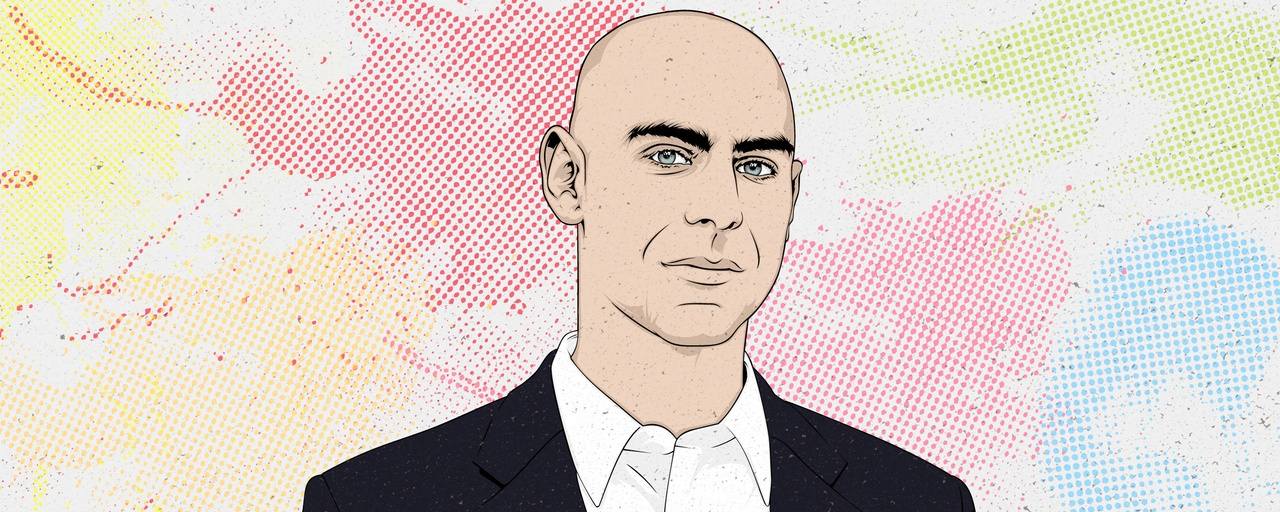When faced with criticism from others, you should not only endure it, but also truly accept and recognize it.
The Translation Bureau is its translation team, focusing on science and technology, business, workplace, life and other fields, focusing on introducing new foreign technologies, new ideas, and new trends.
Editor’s note: In a person’s career, the overall development trajectory is still tortuous. In order to achieve self-improvement in the workplace, in addition to knowing efficient communication skills, it is also inseparable from achieving efficient work, creating a harmonious workplace relationship, and self-criticism. The original title of this article is How to Take Personal Development Off the Backburner — Tactical Frameworks for Leveling Up. The article shares 5 core tactical frameworks for self-improvement, which I hope will inspire you. Due to space problems, this article is divided into three parts: the first, the middle, and the next.
Anne Raimondi, Chief Customer Officer of Guru Platform
4. Use the “trust formula” to repair and strengthen relationships
Whether you work in a startup company that is just getting started or a large company with thousands of employees, you cannot do without interpersonal relationships in your daily work. As we all know, interpersonal relationships are the root of personal connections and career development.
Many people refer to career development when setting personal development goals, or wish to become better interpersonal network communicators. However, they often overlook the fact that in this process, building mutual trust is a very critical step.
Anne Raimondi (Anne Raimondi) is the chief customer officer of the online knowledge management platform Guru. She said, If you are in the workplaceWhen you don’t get along well with your boss or colleagues, the reason is usually simple, that is, you don’t trust each other.
The reason why Raymondi came to this conclusion mainly came from his own experience. Before, her two direct supervisors didn’t get along well at work, and for this, she also felt very embarrassed.
The two bosses did not agree with each other, and there was a dispute about this. Not only that, the work progress of the entire team is also affected by their conflicts.
This is a simple and profound discovery, which reminds Raymondi of a book he read many years ago, called “The Trust Equation” (The Trust Equation) . The so-called trust formula is as follows:
In essence, the degree of your trust in someone is equal to their credibility in something. They prove their credibility over time, And the sum of their authenticity in terms of being human, divided by the circumstances in which they acted in accordance with their personal interests (the above variables are all subjective judgments of the person on other people). Specifically:
-
Credibility: If a person seems to have the knowledge, experience, and familiarity to perform a particular task well, then You will think he is credible. Past work, lessons learned, the insights they provide, and the terminology used are the best symbols. Within an enterprise, there are two main scenarios where credibility is compromised: when people assume a new role in the organization or take over the team; and when someone is doing something that has never been before, or thinks up something unprecedented Things.
-
Reliability: If some people do what they say, then people will think they are reliable. You hope that any work assigned to them can be done well. Whether things go well or not, heWe can all be responsible for it. They will learn from their mistakes and solve them in time. At the same time, they will be consistent in behavior, responsiveness and work quality.
-
Authenticity: This is a rather vague term that is often overturned. Its true meaning in practice is: how easy is it to understand this person? Do you know what they care about? What affects them? What motivates them? Real people do not always need to maintain a state of being completely open to the outside world, or always know the answer, or perfect, but their words and deeds are always consistent with what they say.
-
Personal interest perception: Does anyone seem to do things only for themselves? Maybe it is to get their appreciation, or to achieve a good result, or to make more money. It is worth noting that the greater the degree of perception of personal interests, the lower the trust between people. In addition, the more people who work for the benefit of the team, end users, or higher goals, the easier it is to trust them.
Therefore, if you feel that your relationship with a colleague, manager, or one of your direct supervisors is starting to become unharmonious, you should immediately stop what you are doing . Calm down, stand on the other side’s perspective, and take the time to think about each of the above variables.
-
Would you be annoyed that the other party did not complete a certain task on time, and feel that you must pay more attention to these details in the future, so as to ensure that all tasks are carried out in order carry out?
-
For a certain result, it was originally a joint effort of the team. Is there a situation where a colleague is robbing it?
-
After accepting a new team, will any colleagues doubt your credibility?
-
Have anyone reported to you that your communication and sharing in certain aspects are not transparent, and you will only highlight your personal achievements blindly?
Reflect on the true core of the problem, and thenOn the basis of maintaining a harmonious relationship, solve problems through dialogue.
“When you realize that a factor is hindering your good communication and cooperation with another person, you should first make yourself aware of the relationship between you and the other person How important is it to you.” Raymondi said, “Take an inventory of all feasible solutions to make working relationships with each other more harmonious, so as to be more likely to complete more work and achieve better results. You should think, if in the future 5 If you need to work with each other for 10 years, what time and energy might be wasted? Through this question, you may be able to find the most urgent thing to complete. Then, reconfirm and focus on a certain variable of the trust formula and expand further Communicate.”
For example: “Hey, I want to talk to you. Recently I discovered that there seems to be some changes in our relationship. When X happens, it produces Y for me For me, I attach great importance to our relationship with each other, so I want to know your views and what we can do in the future. In this way, we can accomplish more work and achieve greater achievements together .”
Through this trust formula, Raymondy helped many colleagues repair and strengthen the relationship with other colleagues. Understanding complex and constantly changing relationships seems to be a difficult task, and you may have to have a background in psychology. However, when you try to decompose these relationships and regroup them into a trust formula, you can further explore the potential challenges that have surfaced and find a way forward.
Regarding trust, we need to realize that this is a very basic interpersonal relationship issue, but many people often ignore mutual trust. If you can train yourself to discover the importance of trusting each other from communicating with others, this will inevitably give you a great advantage.
5. How to (really) start accepting criticism
“The New York Times” bestselling author Adam Grant created his blog channel, “Worklife”, and he hopes to use the show to let himself go Enter some of the most extraordinary workplaces in the world, discover some unexpected insights, and apply them to a wider work culture.
In the process, he came into contact withHe went into the “Daily Show” hosted by Trevor Noah and walked into the screenwriter room of the show; he also walked into the NBA Boston Celtics locker room, Learn the story behind this team; he even got together with some astronauts, during which another astronaut called from the International Space Station and they also talked about the unique remote working environment.
The New York Times bestselling author, Professor Adam Grant. Image credit: Alejandro Garcia Ibanez
In Grant’s survey, he noticed one thing in common, whether it’s telling a joke in the opening remarks, taking (or sometimes missing) a winning blow before the deadline, or Say you live in a space capsule together for a few months, you need to accept criticism.
Those who are unable to firmly put forward crazy ideas usually stop further action because of fear of others’ words. However, if you want to be truly involved in the journey of self-improvement, you must put your goals outside the areas of improvement you identify.
In this regard, Grant has also changed. “Early in my career, I especially hope that my students and colleagues will like me.” He said, “Now, what I care more about is whether everyone respects my views. If someone says to me,’Although I disagree What you said, but it caused me to think deeply.’ Then I will be more excited.”
When facing criticism from others, you should face it with curiosity instead of showing strong fighting spirit. “People are beginning to realize that if their goal is to be valued or respected by others, then they should pay less attention to how to prove themselves and pay more attention to how to improve themselves.” Grant said.
The irony is that if you want to make a good impression, don’t focus on how to make a good impression.
So, what if it is possible to accept criticism instead of gritted teeth? In this regard, Grant summarized the following two suggestions.
Abandon the “Proof” mode and turn on the “Increase” mode
“When we face criticism from others, our ego mentality becomes very strong, and the self-defense mode is turned on. This is the so-called proof mode, which is the brain The initial emotional response of the bottom layer.” Grant said, “Fortunately, you can change it by improving the mode. In the improving mode, you instinctively hope to get better and recognize that you are always improving. strong>”
In terms of turning on the personal improvement mode, Grant has the following two suggestions:
-
Go to crowded places. “One of the best ways to start the improvement model is to ask others to criticize you in public, or to criticize yourself in public. This method can help you stop being self-defensive.” Grant said, “I know a founder After the company he founded exceeded 100 employees, he sometimes felt that his subordinates did not tell the truth. So he called all the staff to a meeting and said at the meeting, “If I do what If it’s not right, I hope someone can stand up and tell me. If no one points out these issues today, we won’t leave the meeting.’ After that, he started self-criticism, which also allowed more people to integrate into the current background.”
-
Get meta feedback. As Professor Grant needs to get feedback from students during the teaching process, he also has a deep understanding of how to deal with these opinions. “In the midterm, I will ask students to provide feedback. After collecting all the students’ feedback, I will organize all the content, make it public and share it verbatim with the students. In addition, I have further Action. In subsequent courses, I will analyze the feedback in class, determine the relevant content, and outline the changes that will be made next.” Grant said, “Afterwards, I will consult the students’ feedback again. This In the process, it’s interesting that the students have already made comments and feedback on the course, but I will still give my feedback in class, and


